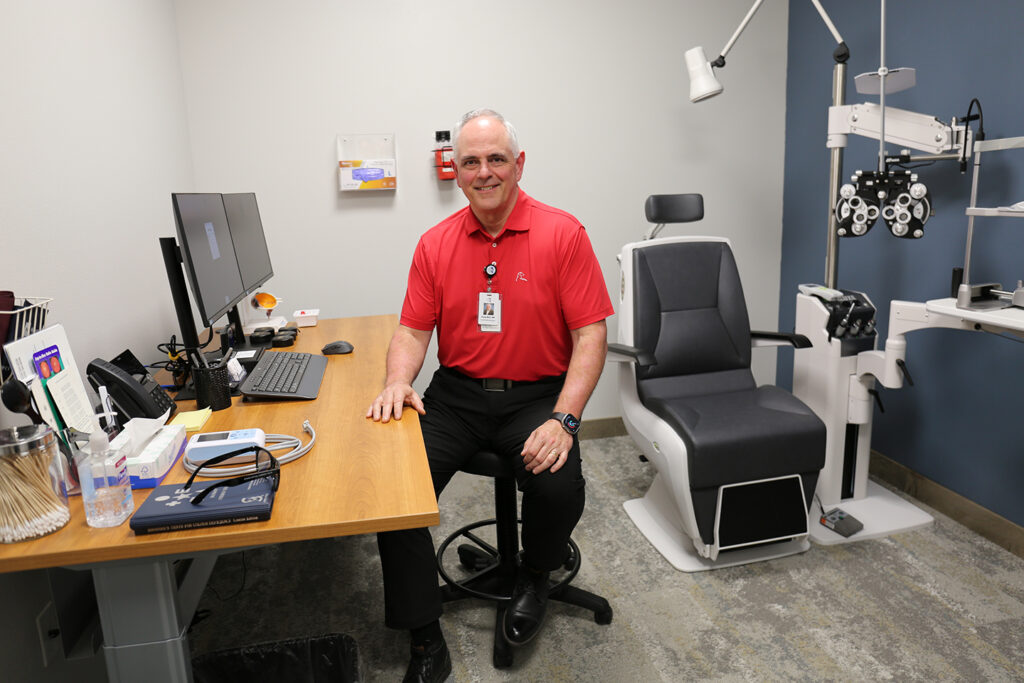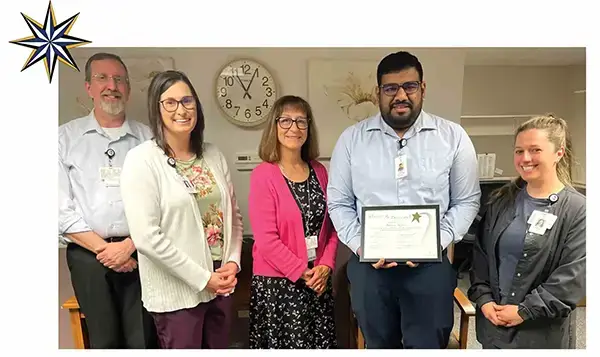
Comprehensive Eye Exams

Your vision is one of your most precious senses, and protecting it is essential for your quality of life. Have you noticed any recent changes in your eyesight, such as blurriness, eye strain, or difficulty reading? These could be signs that it’s time for a check-up. A comprehensive eye exam is more than just a test for glasses; it is a vital health screening that provides a comprehensive picture of your eyes’ health.
At Reedsburg Area Medical Center (RAMC), we are committed to delivering the highest quality of vision care. Our expert team, led by Ophthalmologist Dr. Douglas Bull, offers thorough evaluations to identify and address issues early, helping you maintain clear and healthy vision for years to come.
Why Regular Eye Exams Should Matter to You
Your eyes are one of your most important tools for living life to the fullest. Regular eye exams help protect your vision and catch problems before they become serious. A comprehensive eye exam, inclusive of a health history review, is much more than just reading letters on a chart. It’s a complete checkup of your eye health. During your visit, we test your vision, check for eye diseases, and look at the health of all parts of your eyes—from front to back.
Over 11 million Americans have vision problems that could be found early with routine eye exams. Many serious eye conditions like glaucoma, cataracts, macular degeneration, and diabetic eye disease don’t have early warning signs. By the time you notice any vision changes or symptoms, damage may have already happened. That’s why regular eye exams matter so much.
What’s Included in a Comprehensive Eye Exam
A comprehensive eye exam is different from a simple vision screening. While a screening only checks if you can see clearly, a comprehensive exam involves a patient history discussion and looks at the overall health of your eyes and can detect diseases before you notice any symptoms. Think of it as a wellness checkup for your vision—we’re not just updating your prescription, we’re making sure every part of your eye is healthy and working properly.

When you come in for a comprehensive eye exam, here’s what we’ll do:
Vision Testing – We check how clearly you see and determine if you need glasses or contacts.
Eye Health Evaluation – We examine all parts of your eyes, including the cornea (clear front surface), retina (back of the eye), and optic nerve.
Pressure Testing – We measure the pressure inside your eyes to screen for glaucoma.
Pupil Dilation – We use special eye drops to widen your pupils, allowing us to get a detailed look at your retina and optic nerve. You may experience some temporary light sensitivity afterward.
Digital Retinal Imaging – We take detailed pictures of the inside of your eyes to track your eye health over time.
Medical & Family History Review – We talk about your overall health, medications, and family history of eye problems.
Each of these steps helps us get a complete picture of your eye health.
Who Should Have a Comprehensive Eye Exam
You might be wondering, “Do I really need an eye exam if my vision seems fine?” The answer is yes! Many serious eye conditions develop without any noticeable symptoms. Regular exams, which may include a small puff of air test, are your best defense against vision loss, no matter your age.
Everyone needs regular comprehensive eye exams, but how often depends on your age and health:
Adults – Every 1 to 2 years to catch changes early
Seniors (age 60+) – At least once a year, since age-related eye conditions become more common
People with health conditions – More frequent visits if you have diabetes, high blood pressure, or a family history of eye disease
Contact lens wearers or LASIK candidates – Regular exams to ensure your eyes stay healthy
Not sure how often you should have your eyes checked? Our team can help you determine the right schedule for your vision health.
Common Conditions Detected During an Eye Exam
One of the most valuable benefits of regular eye exams is early detection. Many eye conditions, especially for patients who are at a higher risk, can be treated more effectively when caught early, and some can even be prevented from getting worse. During your exam, we screen for a range of conditions that could affect your vision and overall health.
Regular eye exams help us find and treat these conditions early:
Glaucoma – Damage to the optic nerve caused by high eye pressure. A visual field test is often needed as it often has no symptoms until vision loss occurs.
Cataracts – Clouding of the eye’s lens that makes vision blurry or hazy, affecting peripheral vision. Very common with aging.
Diabetic Retinopathy – Diabetes can damage blood vessels in the retina, leading to vision loss if untreated.
Dry Eye – When your eyes don’t make enough tears or the right quality of tears, causing discomfort and blurry vision.
Refractive Errors – Common vision problems like nearsightedness, farsightedness, and astigmatism that glasses or contacts can correct.
Why Choose Our Practice
When it comes to your vision and achieving clear vision, you deserve care from an eye care team that combines expertise with a personal touch. We understand that visiting the eye doctor can feel overwhelming, so we’ve created a welcoming environment where you and your family can feel comfortable and confident in the care you receive.
Douglas Bull, MD, an Ophthalmologist, provides eye care for residents of Reedsburg and the surrounding communities, helping them achieve clearer vision.
- Dr. Bull is a Board-certified ophthalmologist with years of experience
- Advanced diagnostic technology for accurate results
- Convenient Reedsburg location serving patients throughout the area
- Warm, patient-centered care for the whole family
- In-network with many insurance plans
We treat our patients like family because in a close-knit community like ours, you probably are!
Frequently Asked Questions (FAQs)
How long does a comprehensive eye exam take?
A full eye exam usually takes about 30 to 60 minutes, depending on whether additional tests or pupil dilation are needed. Our team takes the time to ensure your results are accurate and all your questions are answered.
Will my eyes be dilated during the exam?
In many cases, yes. Pupil dilation allows Dr. Bull to get a detailed view of your retina and optic nerve. You may experience temporary light sensitivity or blurred vision afterward, so bringing sunglasses is a good idea.
How often should I schedule an eye exam?
Adults should have an eye exam every one to two years, depending on age, vision needs, and medical history. Individuals with diabetes, high blood pressure, or a family history of eye disease may need more frequent exams.
Can an eye exam detect other health problems?
Yes. Comprehensive eye exams can reveal signs of systemic conditions such as diabetes, high blood pressure, and high cholesterol. Regular exams play an important role in monitoring your overall health, not just your vision.
Meet Douglas Bull, MD
The cornerstone of ophthalmology at Reedsburg Area Medical Center is Dr. Douglas S. Bull, MD. With over 30 years of experience, Dr. Bull delivers expert, compassionate eye care to area residents of Reedsburg and other local communities. He is highly trained in diagnosing and treating a full range of eye conditions—from routine exams and glaucoma management to advanced procedures like laser retina surgery and cataract removal. With his deep expertise and commitment to patient well-being, you can trust your vision is in skilled hands.

Schedule Your Comprehensive Eye Exam Today
Don’t wait for symptoms—protect your vision by scheduling an appointment now. Call 608-768-3900 to schedule with Dr. Bull for a comprehensive eye exam.






